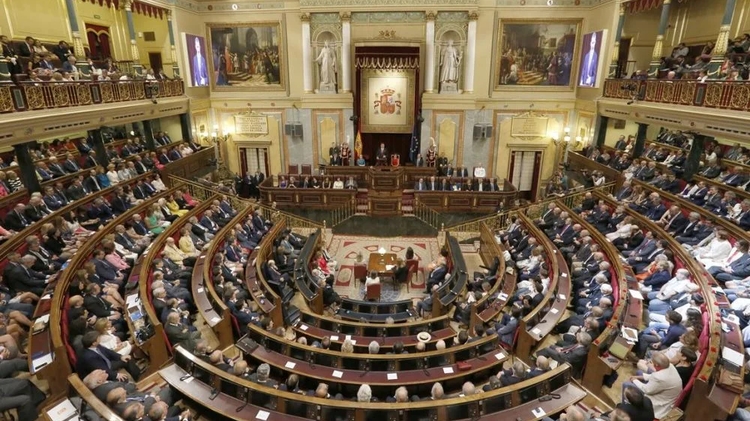Ángel Collado
The Spanish Congress celebrates the anniversary of the Constitution this Tuesday in the midst of an institutional crisis, with the government of Pedro Sánchez focused on controlling the body that interprets the law of laws itself and on abolishing the crime of sedition established until now to defend the constitutional framework.
Moreover, the breakdown in relations between the two main parties of the parliamentary arc, PSOE and PP, prevents the renewal of the General Council of the Judiciary (CGPJ, by its acronymous in spanish), which has been pending for four years.
The traditional official reception held in the Lower Chamber will reflect the delicate moment the Constitution is going through. There is no political debate on whether or not it needs to be reformed, as in previous legislatures, but rather on its validity, compliance or liquidation.
The government accuses the opposition of not complying with the Magna Carta by refusing to distribute the judges’ governing body according to quotas. The People’s Party in turn denounces Sánchez for undermining national unity and the constitutional regime in order to ensure his continuity in power with his Catalan and Basque pro-independence allies.
The main representatives of the PSOE and the PP, and some Podemos members, will be present at the event, which, as usual, will not be attended by the separatists who support the coalition government. Nor will there be any leaders from Vox, a party that considers the reception to be “a mockery”. The president of the far-right party, Santiago Abascal, refuses to participate in a party attended by those who “violate and seek to destroy the Constitution”, which is how he refers to the ‘sanchistas’.
The declared adversaries of the constitutional regime will not be in Congress, but they celebrate their successes and advances these days against constitutionalism. The parliamentary spokesman of the party that governs the Catalan Generalitat, Gabriel Rufián, boasts that he has cashed in on his group’s support for the General State Budget by eliminating the crime of sedition from the Penal Code.
This legal change was a bill that Sánchez had pending with his partners and will be paid before the end of the year with the consequent criminal benefit for the convicted Catalan coup plotters. And if they reoffend, future secessionist attempts against the constitutional framework will be much cheaper as they will be classified as “aggravated public disorder”.
The payment has come together with the two appointments to the Constitutional Court that it is up to the Executive to make. Rather than being close to the Government, as is usually the case, this time the chosen ones are so predictably obedient to the incumbent that they come from the cabinet itself: Sánchez’s first Minister of Justice, Juan Carlos Campo, and the former Director General of the Presidency, Laura Díez.
The names of the two chosen have served to relaunch the PP’s denunciation of the chief executive’s determination to “assault” the Constitutional Court so that the arbitration body and highest interpreter of the law of laws will approve his projects and concessions to the pro-independence supporters.
The records and statements of Campo and Díaz give rise to the opposition’s accusations. The former minister has said in Congress that Spain was entering a “constituent process”. The former high-ranking official of the Ministry of the Presidency under Félix Bolaños previously held a post as a member of the statutory guarantees body of the Generalitat of Catalonia. Laura Díaz attained that post with the combined backing of the secessionist ERC and the Catalan Socialists, and later took up the thesis that the penalty for sedition in the Penal Code was excessive.
In this case, as the Government has not even kept its manners when appointing the two members of the TC, the Popular Party is trying to take its protests to EU bodies. It already did so last year when the coalition government began to process a reform of the judiciary in order to directly control its council. From the current three-fifths qualified majority that requires the opposition to elect members, the PSOE and Podemos wanted to move to a simple majority in order to divide the seats on the CGPJ between them and the pro-independence supporters.
It was Juan Carlos Campo in April 2021 who, as Minister of Justice, communicated the government’s renunciation of this parliamentary reform after meeting with the Justice Commissioner in Brussels.
The institutional crisis, with the constitutional framework questioned by half the government and its partners, will be more present than ever on the anniversary of the Magna Carta approved by the Spanish people in 1978.







